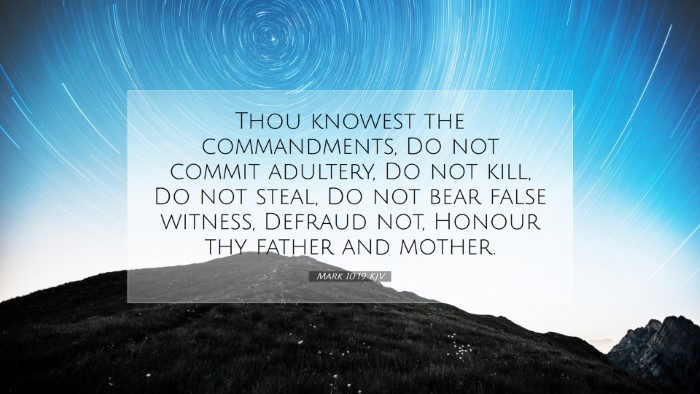Commentary on Mark 10:19
Verse Context: Mark 10:19 states, “Thou knowest the commandments, Do not commit adultery, Do not kill, Do not steal, Do not bear false witness, Defraud not, Honour thy father and mother.” This verse is part of a larger interaction between Jesus and a rich young ruler who seeks eternal life.
Insights from Matthew Henry
Matthew Henry offers a thorough examination of this passage, emphasizing the rich young ruler's understanding of the commandments. He notes that Jesus outlines the moral law through a selection of commandments, which pertain to both divine and human relationships.
Henry explains that the commandments cited by Jesus focus on the fundamental duties we owe to one another in society: fidelity, respect for life, and honesty. This was to show the young man that his understanding of righteousness should extend beyond mere ritual or observance to a deeper moral obligation.
Insights from Albert Barnes
Albert Barnes elaborates on the significance of the commandments by highlighting the progression of moral obligation in Jesus’ response. Barnes points out that the commandments mentioned are foundational to societal conduct and are crucial for personal integrity.
In considering the nature of the rich man's question regarding eternal life, Barnes asserts that adherence to the commandments is essential but not sufficient for salvation. He underscores the necessity of grace and the inward transformation that only Jesus can provide, contrasting external compliance with internal devotion.
Insights from Adam Clarke
Adam Clarke emphasizes the ethical dimensions reflected in the commands given by Jesus. He articulates that Jesus enumerates mandates which expose the young ruler’s moral condition. Clarke highlights the point that many externalities of behavior might appear virtuous, yet a mere outer facade cannot fulfill the deeper demands of God’s law, which calls for complete devotion and love.
Moreover, Clarke points out the fact that Jesus omitted the commandment concerning coveting, which may be the young man's hidden struggle. This suggests a call to introspection, urging individuals to consider not only their actions but also the thoughts and desires of their hearts.
Theological Implications
This verse has significant theological implications as it stresses the importance of adhering to moral law as a representation of one's relationship with God. It serves as a reminder that while personal achievements and adherence to ethical standards are important, they cannot in themselves secure eternal life.
Grace vs. Law
The interaction between Jesus and the young ruler encapsulates the larger biblical theme of grace versus law. As pastors and theologians reflect on the commandments, they must convey that while the law guides moral living, it is ultimately through Jesus’ grace that true salvation is attained.
Call to Discipleship
Jesus’ reference to the commandments also serves as a precursor to His teaching on discipleship. Following Christ involves not only moral obedience but a radical reorientation of one’s life priorities—moving from adherence to rules towards a relational faith empowered by the Holy Spirit.
Application for Pastors and Devotion in Teaching
This scripture presents an opportunity for pastors to remind their congregations of the call to integrity in both personal and communal life. Church leaders should encourage the faithful to pursue a heartfelt obedience to God's commandments out of love rather than duty.
Furthermore, the passage serves as a foundation for discussions on ethical living and the nature of true discipleship. It invites believers to not only evaluate actions but to reflect on their motivations and desires in light of Christ’s teachings.
Concluding Thoughts
The exhortation found in Mark 10:19 is a profound invitation to a deeper understanding of God’s commandments as pathways to holiness and true relationship with God. As the church continues to navigate the complexities of faith, these reflections encourage both scholars and laypeople alike to engage with the word of God meaningfully and to examine their lives in the light of His grace and commandments.


